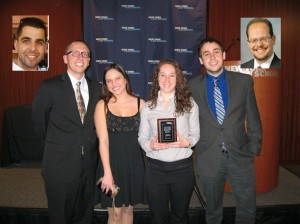That Extra Incentive
 Most of us are familiar with wellness programs—programs sponsored by our employer or health plan that try to incentivize us to eat healthier, sleep well, and get more exercise. If you’re anything like me, it helps to have that extra push or incentive, especially around the holidays when sweets abound, to stay on track—or at least, to not stray too far from health goals. Most of these programs have the added advantage of lowering health care costs, both by providing financial incentives to reduce immediate costs to the individual employees and by boosting the overall health of the employees as a whole, which could reduce future health care costs. However, extensive technical regulations and recent litigation by the AARP make implementing health and wellness programs increasingly tricky for employers.
Most of us are familiar with wellness programs—programs sponsored by our employer or health plan that try to incentivize us to eat healthier, sleep well, and get more exercise. If you’re anything like me, it helps to have that extra push or incentive, especially around the holidays when sweets abound, to stay on track—or at least, to not stray too far from health goals. Most of these programs have the added advantage of lowering health care costs, both by providing financial incentives to reduce immediate costs to the individual employees and by boosting the overall health of the employees as a whole, which could reduce future health care costs. However, extensive technical regulations and recent litigation by the AARP make implementing health and wellness programs increasingly tricky for employers.
Title II of the Genetic Information Nondiscrimination Act of 2008 (“GINA”) and the regulations promulgated by the U.S. Equal Employment Opportunity Commission (the “EEOC”) thereunder, generally prohibit “an employer [from] request[ing], require[ing], or purchas[ing] genetic information [which includes an individual’s family medical history] with respect to an employee or a family member of the employee.” 42 U.S.C. § 2000ff–1(b). However, there is an exception for wellness programs, as long as employers jump through a set of hoops. 29 CFR § 1635.8(b)(2). While not without its own problems and excesses, the exception in the EEOC regulations at least allows employers to provide incentives to those employees willing to participate in employer-sponsored wellness programs.
The AARP doesn’t like this whole “incentive” idea to begin with. It recently filed a lawsuit against the EEOC in an attempt to vacate the regulations entirely. AARP v. U.S. Equal Employment Opportunity Commission, No. 1:16-cv-02113 (D. D.C. 2016) (hereafter the “AARP Complaint”). This actually might not be a bad idea, except for the fact that the AARP thinks that the regulations do not have enough hoops. In fact, the AARP would prefer that the regulations abolish any permission for any incentives or penalties to induce participation in employer-sponsored wellness programs. The AARP alleges in its complaint that all employer incentives or penalties to induce participation in employer-sponsored wellness programs violate Title I of the ADA and Title II of GINA. AARP Complaint at 3.

